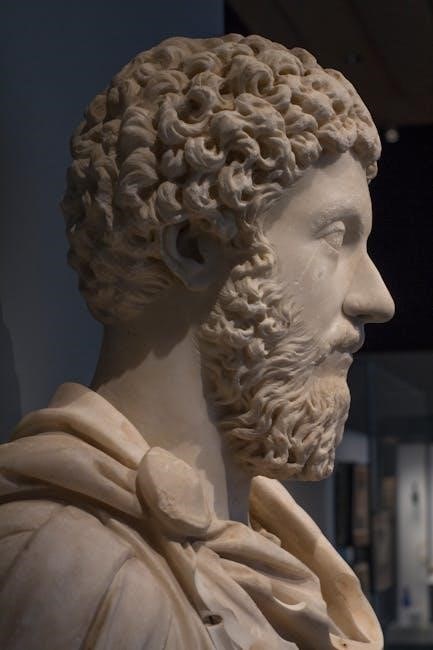Marcus Aurelius, a Roman emperor and philosopher, wrote Meditations as a personal guide to Stoic philosophy. His writings, translated by Gregory Hays, offer timeless wisdom on leadership, self-reflection, and resilience.
Marcus Aurelius ruled Rome from 161 to 180 AD, facing numerous challenges. His Meditations, written in Greek, remain a cornerstone of Stoic thought, providing practical advice for modern readers.
Gregory Hays’ translation brings Aurelius’ insights into clear, modern English, making the text accessible and impactful. His work bridges ancient philosophy with contemporary relevance.

Overview of Marcus Aurelius and the Significance of Meditations
Marcus Aurelius, a Roman emperor and philosopher, wrote Meditations as a personal reflection on Stoic philosophy. This work, written in Greek, is a rare glimpse into the mind of a ruler grappling with power, morality, and existence. Its significance lies in its timeless wisdom, offering insights into leadership, resilience, and self-improvement. Meditations is not a formal treatise but a deeply personal journal, making it uniquely relatable. Gregory Hays’ translation revitalizes the text, ensuring its relevance for modern readers seeking guidance on navigating life’s challenges with virtue and clarity. The book remains a cornerstone of Stoic thought, blending philosophy with practical application.
Gregory Hays’ Translation and Its Importance
Gregory Hays’ translation of Marcus Aurelius’ Meditations is a landmark achievement, offering a fresh and accessible interpretation of the ancient text. Hays’ work is the first new translation in decades, restoring the original’s clarity and immediacy. His version captures Aurelius’ introspective voice, making the philosopher-emperor’s thoughts resonate powerfully with modern readers. By rendering the Greek text into vivid, contemporary English, Hays ensures that Aurelius’ timeless wisdom on leadership, resilience, and self-reflection reaches a broader audience. This translation is celebrated for its fidelity to the original while enhancing its readability, making it an essential resource for both scholars and general readers.

The Historical Context of Marcus Aurelius
Marcus Aurelius reigned as Roman Emperor from 161 to 180 AD, facing wars, plagues, and personal loss. His Meditations reflect his struggles and philosophical introspection during these challenging times.

Biography of Marcus Aurelius: Life, Reign, and Legacy
Marcus Aurelius Antoninus was born in 121 AD to a wealthy Roman family and was adopted by Emperor Antoninus Pius. He succeeded Pius in 161 AD, ruling Rome with wisdom and justice. His reign was marked by military campaigns, a devastating plague, and personal tragedies, including the death of his co-emperor Lucius Verus.
Aurelius is remembered as a philosopher-king, embodying Stoic ideals. His Meditations, written in Greek, reveal his introspective nature and commitment to virtue. Gregory Hays’ translation has made his teachings accessible to modern readers, ensuring his legacy as a source of wisdom on leadership and resilience.
The Time Period and Challenges Faced by Marcus Aurelius

Marcus Aurelius ruled Rome from 161 to 180 AD, a period marked by significant turmoil. He faced external threats, including wars with Germanic tribes and a Parthian campaign, while internally, the empire grappled with economic strain and social unrest. A devastating plague further exacerbated the challenges, weakening the empire’s stability.
Despite these struggles, Aurelius remained a steadfast leader, guided by Stoic principles. His personal hardships, including the loss of his daughter and co-emperor Lucius Verus, deeply influenced his philosophical reflections in Meditations. Gregory Hays’ translation highlights his resilience and wisdom, offering insights into how he navigated adversity with virtue and equanimity. His reign and writings exemplify a philosopher-king’s balance of leadership and introspection.
Structure and Content of Meditations
Meditations is divided into 12 books, each focusing on specific themes; Gregory Hays’ translation organizes the text thematically, exploring Stoicism, self-reflection, and leadership. The structure offers practical wisdom, making it timeless and universally relevant.
Breakdown of the Books in Meditations
Meditations is divided into 12 books, each with distinct themes and reflections. Book 1 focuses on debts and lessons, highlighting Aurelius’ values and influences. Books 2 and 3, written on military campaigns, reflect on resilience and Stoic principles. Books 4 through 10 explore universal themes like duty, ethics, and self-improvement. Book 12 emphasizes overcoming personal limitations, urging alignment of actions with values. Gregory Hays’ translation preserves the original structure, offering a clear and organized journey through Aurelius’ timeless wisdom.
Key Themes: Stoicism, Self-Reflection, and Leadership
Marcus Aurelius’ Meditations explores Stoicism, emphasizing reason, self-control, and indifference to external events. Through self-reflection, he examines his thoughts and actions, fostering personal growth and moral clarity. Leadership emerges as a central theme, with Aurelius advocating for justice, humility, and serving others. Gregory Hays’ translation highlights these themes, making Aurelius’ wisdom accessible. His writings inspire readers to embrace resilience, ethical living, and the pursuit of virtue, offering timeless guidance for modern leaders and individuals seeking self-improvement.
Gregory Hays’ Translation of Meditations
Gregory Hays’ translation of Marcus Aurelius’ Meditations offers a fresh, modern rendering of the philosopher-emperor’s writings. His clear, elegant English brings ancient wisdom to contemporary readers, enhancing accessibility and relevance.
Features of the Gregory Hays Translation
Gregory Hays’ translation of Marcus Aurelius’ Meditations is celebrated for its clarity and modernity. Hays renders the ancient text in fresh, accessible English, preserving the original’s philosophical depth while making it approachable for contemporary readers. His translation avoids archaic language, ensuring the emperor’s thoughts resonate vividly today. The text maintains its spiritual and ethical essence, offering practical wisdom on leadership, resilience, and self-reflection. Hays’ work bridges the gap between the 2nd-century context and modern life, making Meditations a timeless guide for personal growth and philosophical inquiry.
Reception and Reviews of the Translation
Gregory Hays’ translation of Marcus Aurelius’ Meditations has received widespread acclaim for its clarity and accessibility. Reviewers praise Hays for rendering the ancient text into modern, idiomatic English while preserving its philosophical depth. The translation is described as fresh and engaging, making Aurelius’ wisdom feel contemporary. Critics highlight its ability to connect with readers, offering practical insights for personal growth and leadership. Notable figures like James Clear and Robert Fagles have endorsed the work, with Clear calling it “one of the greatest books ever written.” The translation’s success lies in its ability to bridge the gap between ancient philosophy and modern life, ensuring Meditations remains a timeless guide for seekers of wisdom.

Key Quotes and Teachings from Meditations
Marcus Aurelius offers timeless wisdom, such as “Waste no more time arguing what a good man should be. Be one.” His teachings emphasize living virtuously, embracing challenges, and cultivating inner strength, providing guidance for modern readers seeking personal growth and resilience.
Most Influential Passages and Their Relevance Today
Marcus Aurelius’ Meditations contains profoundly influential passages that resonate deeply in modern times. One of the most celebrated quotes, “The impediment to action advances action,” highlights the Stoic principle of turning obstacles into opportunities; Another impactful passage, “You have power over your mind, not outside events,” underscores the importance of mental resilience and focus on what one can control. These teachings are increasingly relevant today, offering guidance on coping with stress, fostering personal growth, and embracing challenges with equanimity. Gregory Hays’ translation ensures these timeless lessons remain accessible and relatable, making Marcus Aurelius’ wisdom a cornerstone for modern self-improvement and leadership.

Practical Wisdom for Modern Readers
Marcus Aurelius’ Meditations, as translated by Gregory Hays, offers timeless wisdom for contemporary life. His teachings emphasize self-awareness, resilience, and ethical decision-making; Passages like “Waste no more time arguing what a good man should be. Be one” encourage action over debate, while “If it is not right, do not do it” promotes moral clarity. These principles guide modern readers in navigating stress, relationships, and personal growth, making Stoicism a powerful tool for today’s challenges;

Hays’ translation ensures these insights are accessible, bridging ancient philosophy with modern relevance, inspiring readers to embrace a life of purpose and integrity amidst life’s uncertainties.
The Relevance of Meditations in the Modern World
Marcus Aurelius’ Meditations, translated by Gregory Hays, remains a timeless guide for modern life. Its teachings on resilience, integrity, and self-awareness resonate deeply today, offering wisdom for personal growth and leadership in a chaotic world.
How Meditations Applies to Personal Growth and Leadership
Marcus Aurelius’ Meditations offers profound insights for personal growth and leadership. His writings emphasize self-reflection, resilience, and ethical decision-making, encouraging readers to cultivate inner strength and wisdom; The Stoic principles outlined in the text, such as focusing on what is within one’s control and embracing challenges as opportunities for growth, are timeless. Aurelius’ experiences as a leader during turmoil provide practical lessons in maintaining integrity and composure under pressure. Gregory Hays’ translation makes these teachings accessible, inspiring modern readers to apply Stoic philosophy to their lives, fostering personal development and effective leadership in any context.

The Enduring Legacy of Marcus Aurelius

Marcus Aurelius is revered as a philosopher-king, whose reign and writings embody wisdom and integrity. His Meditations, a personal reflection on Stoic philosophy, remains a cornerstone of ethical thought. Despite facing significant challenges, Aurelius ruled with justice and compassion, leaving a legacy of moral leadership. His teachings on resilience, self-awareness, and the pursuit of virtue continue to inspire leaders and individuals worldwide. Gregory Hays’ translation has further cemented his influence, making his timeless wisdom accessible to modern audiences. Aurelius’ enduring legacy lies in his ability to bridge ancient philosophy with universal relevance, offering guidance for navigating life’s complexities.
Marcus Aurelius’ Meditations, masterfully translated by Gregory Hays, remain a timeless guide to Stoic wisdom, offering insights into leadership and personal growth that resonate today.
Final Thoughts on the Importance of Meditations
Marcus Aurelius’ Meditations, as translated by Gregory Hays, offers timeless wisdom on Stoicism, self-reflection, and leadership. Its universal appeal lies in its practical guidance for personal growth and resilience. Aurelius’ insights, written as personal notes, transcend time, addressing challenges faced by individuals across centuries. Hays’ translation ensures the text remains accessible, bridging ancient philosophy with modern relevance. The work’s enduring influence underscores its value as a tool for self-improvement and ethical living. For anyone seeking wisdom, Meditations remains an indispensable guide, proving philosophy’s power to transform lives.
Recommendations for Further Reading
For deeper exploration, readers can delve into Meditations by Marcus Aurelius, translated by Gregory Hays, available in various formats, including a premium leather edition. Additionally, works by Epictetus, a key Stoic influence on Aurelius, offer complementary insights. Modern interpretations, such as Ryan Holiday’s The Daily Stoic, provide practical applications of Stoic principles. For historical context, biographies of Marcus Aurelius, like Frank McLynn’s Marcus Aurelius: Warrior, Philosopher, Emperor, enrich understanding. These resources together create a comprehensive path to Stoic wisdom and its modern relevance.


